| Srl | Item |
| 1 |
ID:
153975
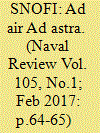

|
|
|
| 2 |
ID:
124758
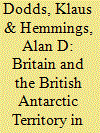

|
|
|
|
|
| Publication |
2013.
|
| Summary/Abstract |
Britain's contemporary and future relationship with the British Antarctic Territory and the wider region is the subject matter of this article. In the aftermath of the ill-fated plans for a merger of British Antarctic Survey (BAS) and the National Oceanography Centre, it is timely to ask how the UK projects influence and secures its scientific, resource and strategic interests. The contemporary Antarctic is increasingly characterized by tension over resource management and conservation politics as Antarctic Treaty parties disagree, both in private and public, over the purpose of legal instruments and the regulation of activities such as fishing and marine conservation. While we do not predict the collapse of the Antarctic Treaty System (ATS), our analysis suggests that the effectiveness and legitimacy of the ATS is increasingly under challenge. The United Kingdom's position as a claimant state and original signatory to the Antarctic Treaty is complicated by the presence of counter-claimants (Argentina and Chile) and a wider preoccupation with other overseas territories, such as South Georgia and South Sandwich Islands and the Falkland Islands. Polar science, carried out by BAS and other British agents, remains critical not only for maintaining the UK's 'soft power' but also increasingly for cementing a 'strategic presence' in the Antarctic. The article ends with a cautionary note: scientific excellence is no longer sufficient to guarantee geopolitical/strategic interests and there is growing evidence that claimant and non-claimant states alike are no longer regarding Antarctica as an area that will remain free of intensifying and diversifying resource exploitation.
|
|
|
|
|
|
|
|
|
|
|
|
|
|
|
|
| 3 |
ID:
123245
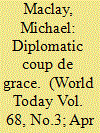

|
|
|
| 4 |
ID:
130668
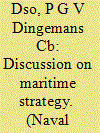

|
|
|
| 5 |
ID:
076995
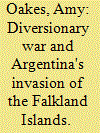

|
|
|
|
|
| Publication |
2006.
|
| Summary/Abstract |
Why do states launch diversionary conflicts? In particular, why did Argentina invade the Falkland Islands in 1982? The existing literature tends to analyze diversionary conflict by examining the direct relationship between domestic unrest (the independent variable) and the use of force (the dependent variable). But such an approach ignores critical variables that shape the likelihood of diversionary conflict. When states face domestic unrest, they have a number of options: they can launch a diversionary conflict, they can reform, or they can repress. We therefore need to consider which variables alter the attractiveness of each of these options, employing what I term "the policy alternatives approach." The decision to launch a diversionary conflict may result more from the inability to reform or repress, than it does from the perceived utility of using force to rally the public. An important variable that facilitates or constrains a state's ability to reform or repress is state extractive capacity. The policy alternatives approach enables a new explanation for the invasion of the Falklands, based on the interaction between domestic unrest and low state extractive capacity, and also highlights a number of other variables that may explain diversionary conflicts.
|
|
|
|
|
|
|
|
|
|
|
|
|
|
|
|
| 6 |
ID:
188217
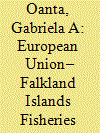

|
|
|
|
|
| Summary/Abstract |
This article analyzes fisheries relations between the European Union and the Falkland Islands from a legal perspective, paying special attention to the impact of the United Kingdom’s withdrawal from the European Union on the fishing carried out in this British Overseas Territory. Following a brief overview of the fishing conducted in these controversial waters and internationally disputed maritime zones, it examines European Union–Falkland Islands fisheries relations, first until 31 December 2020, and second in the wake of Brexit, with particular emphasis on those measures (mitigation and treaty based) that the European Union might take now that the United Kingdom is no longer a member.
|
|
|
|
|
|
|
|
|
|
|
|
|
|
|
|
| 7 |
ID:
012473
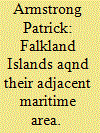

|
|
|
|
|
| Publication |
1997.
|
| Description |
1-43
|
|
|
|
|
|
|
|
|
|
|
|
|
|
|
|
| 8 |
ID:
122182
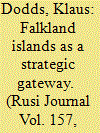

|
|
|
|
|
| Publication |
2012.
|
| Summary/Abstract |
The UK-Argentinian dispute regarding the sovereignty of the Falkland Islands has been central to public debate in this the 30th year since the Falklands War. Less well known, however, are the strategic challenges facing the UK in managing its Overseas Territories in the region, to which the Falklands are a 'strategic gateway'. Klaus Dodds surveys the rationales underpinning current UK policy regarding the South Atlantic and Antarctic Overseas Territories - sovereignty, security and stewardship - and addresses the implications for regional geopolitics of the recent saga involving the proposed merger of the British Antarctic Survey and National Oceanography Centre.
|
|
|
|
|
|
|
|
|
|
|
|
|
|
|
|
| 9 |
ID:
156515
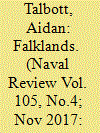

|
|
|
| 10 |
ID:
127262


|
|
|
| 11 |
ID:
118278


|
|
|
|
|
| Publication |
2013.
|
| Summary/Abstract |
Spoiler nations shouldn't be allowed to prevent progress on a common regional agenda among democracies willing to work with Washingon.
|
|
|
|
|
|
|
|
|
|
|
|
|
|
|
|
| 12 |
ID:
113281
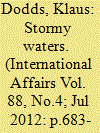

|
|
|
|
|
| Publication |
2012.
|
| Summary/Abstract |
This article considers Britain's relationship with the Falkland Islands and the wider context of UK-Argentine relations. It does so by considering three main themes. First, the current Argentine government's strategy towards the Falklands (Islas Malvinas) and the manner in which the question of disputed ownership has been tied into wider Latin American relationships designed to unsettle UK and Falkland Islands interests. Second, the debate surrounding the defence of the Falklands is examined for the purpose of considering how this issue, especially sensitive given the 30th anniversary of the 1982 conflict, brings into sharp relief the implications of recent defence and spending reviews. Finally, the article aims to assess and evaluate the manner in which the Falkland Islands community engages with and responds to worsening UK-Argentine relations. It is concluded that UK-Argentine relations are in their worst state since 1982 and that there is little or no prospect of any improvement given the Argentine government's commitment to force the UK into entering sovereignty negotiations. On its side, the UK and the Falkland Islands' community do not believe that sovereignty is negotiable and would rather consider how more cordial relations could be established in a manner reminiscent of the late 1990s.
|
|
|
|
|
|
|
|
|
|
|
|
|
|
|
|